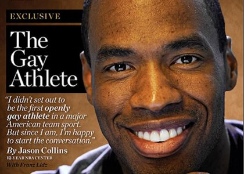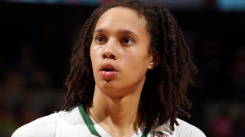BY NATASHA BARSOTTI — “I’m a 34-year-old NBA center. I’m black. And I’m gay.”
![]()
And with that Jason Collins, who has played with both the Boston Celtics and the Washington Wizards in a 12-year National Basketball Association (NBA) career, became the first male athlete still active in a major American professional sport to come out.
Collins made the revelation in a piece he wrote for the May 6 issue of Sports Illustrated.
“Imagine you’re in the oven, baking. Some of us know and accept our sexuality right away and some need more time to cook. I should know — I baked for 33 years,” Collins says.
Collins’s revelation came in the midst of heightened speculation that one or more athletes, still active in their sports, were mulling the prospect of coming out. It was recently reported, on nfl.com, that former Baltimore Ravens linebacker
Brendon Ayanbadejo has indicated there is at least one athlete who wants
to break the silence about his sexuality but is interested in doing so
with another athlete or athletes.
Collins, now a free agent, says he didn’t “set out to be the first openly gay athlete playing in a major American team sport,” but he’s “happy to start the conversation.”

“I wish I wasn’t the kid in the classroom raising his hand and saying, ‘I’m different,'” he adds. “If I had my way, someone else would have already done this. Nobody has, which is why I’m raising my hand.”
He says he has no idea how other players will react to his coming out but calls himself a pragmatist. “I hope for the best, but plan for the worst.”
Fellow NBA-ers Kobe Bryant and Steve Nash tweeted their support.
From Bryant: “Proud of @jasoncollins34. Don’t suffocate who u r because of the ignorance of others #courage #support #mambaarmystandup #BYOU”
From Nash: “The time has come. Maximum respect. RT @Baron_Davis: I am so proud of my bro @jasoncollins34 for being real.”
As for fan reaction, Collins says he won’t mind if he’s heckled. “I’ve been booed before. There have been times when I’ve wanted to boo myself. But a lot of ill feelings can be cured by winning.
“I’m a veteran, and I’ve earned the right to be heard. I’ll lead by example and show that gay players are no different from straight ones. I’m not the loudest person in the room, but I’ll speak up when something isn’t right. And try to make everyone laugh.”
He says, however, that he’s glad he’s coming out in 2013 rather than 2003. “The climate has shifted; public opinion has shifted. And yet we still have so much farther to go,” he says. “Everyone is terrified of the unknown, but most of us don’t want to return to a time when minorities were openly discriminated against.”
Collins says he particularly felt the strain of being closeted in March when the US Supreme Court heard arguments on both sides of the same-sex marriage issue.
“Less than three miles from my apartment, nine jurists argued about my happiness and my future. Here was my chance to be heard, and I couldn’t say a thing. I didn’t want to answer questions and draw attention to myself. Not while I was still playing,” he says.
He says he’s impressed by the actions of athletes like Ayanbadejo and Minnesota Vikings punter Chris Kluwe, who are outspoken allies in the fight against homophobia in sport and are among those at the forefront of creating an environment that is welcoming to gay athletes.
In a statement of support, NBA commissioner David Stern says, “We have known the Collins family since Jason and [his twin brother] Jarron joined the NBA in 2001 and they have been exemplary members of the NBA family. Jason has been a widely respected player and teammate throughout his career and we are proud he has assumed the leadership mantle on this very important issue.”
Collins’s coming out follows that of Brittney Griner, who was recently selected as the No 1 pick in the WNBA draft but whose revelation was greeted with little fanfare.
The New York Times‘ Sam Borden writes, “One of the best female athletes in the history of team sports comes out, and the reaction is roughly equivalent to what one might see when a baseball manager reveals his starting rotation for a three-game series in July.”

Borden quotes outsports.com founder Jim Buzinski as saying that rife speculation that an NFL player was planning to come out got 10 times more traffic than Griner — on video — did saying she is a lesbian. The Borden piece puts the muted reaction to Griner’s coming out down, in part, to the notable history of female athletes coming out and remaining active in their sports, pointing to tennis star Martina Navratilova, soccer player Megan Rapinoe and basketball player Sheryl Swoopes, by way of example. The piece also points to the still-prevalent stereotype that female athletes are perceived to be gay as a reason for the ho-hum reaction.

 Why you can trust Xtra
Why you can trust Xtra


